In the rapidly growing world of e-commerce, selling eyeglasses online has become a lucrative business. Choosing the right platform to showcase and sell your eyewear products is crucial for success. In this article, we’ll explore the top five platforms to sell eyeglasses online.
1. Adobe Commerce (Magento 2)
Adobe Commerce, formerly known as Magento 2, is a robust and feature-rich open-source e-commerce platform. Known for its scalability, security, and advanced customization capabilities, it is a preferred choice for businesses of all sizes.

Pros:
- Open Source Platform: Magento is an open-source platform, providing unparalleled flexibility for customization. This means businesses can tailor their online eyewear store to meet specific needs, ensuring a unique and personalized customer experience.
- Feature-Rich Platform: Adobe Commerce (Magento) comes equipped with a comprehensive set of features, from product creation to checkout and marketing. This feature-rich environment streamlines the management of the entire business, making it a powerful choice for eyewear retailers.
- High Scalability: Whether you are a small online business or a giant enterprise, Adobe Commerce scales to fit your needs. This scalability ensures that your online eyewear store can grow alongside your business, accommodating increasing demands seamlessly.
- High Security: Security is a top priority with Adobe Commerce. The platform guarantees the highest level of safety, ensuring that eyewear websites are protected against potential threats, providing peace of mind to both store owners and customers.
- SEO-Friendly Tools: Adobe Commerce offers out-of-the-box tools that enhance the SEO capabilities to sell eyeglasses online. Unique features such as Product Fields Auto-Generation, Category Page Optimization, and Independent Navigation Links contribute to improved visibility and search engine rankings.
- High Performance: With fast page loading speeds and efficient query processing, Adobe Commerce enhances the overall performance of your eyewear website. This not only improves customer experience but also contributes to reduced page abandonment rates and increased conversion rates.
- Latest Technologies: Staying ahead in the competitive e-commerce landscape is essential. Adobe Commerce ensures high usability on mobile devices, easy integration with third-party services, and a vast array of extensions for further customization.
Cons:
- Expensive: Adobe Commerce may come with a higher price tag, making it less accessible for smaller businesses with limited budgets.
- Might be Complicated: The complexity of Adobe Commerce might pose a challenge for beginners, requiring a learning curve for effective utilization.
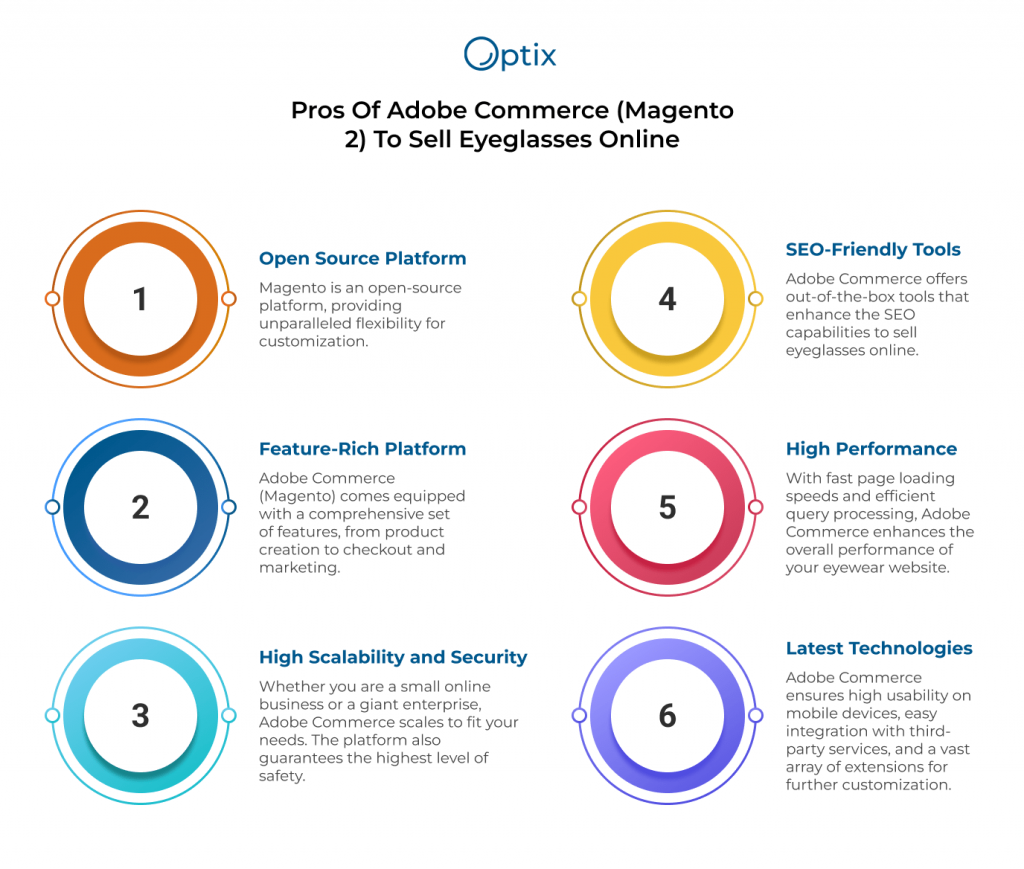
Extensions for Magento 2 Eyewear Shops
In enhancing the eyewear shopping experience on a Magento 2 platform, a range of innovative extensions can be seamlessly integrated. Virtual try-on solutions such as Fitting Box and Luna.io bring a cutting-edge dimension to sell eyeglasses online. These extensions employ augmented reality and advanced image processing technologies to allow customers to virtually try on different eyeglass frames, helping them visualize how the eyewear will look on their face before making a purchase.
The powerful suite of tools and extensive community support makes Adobe Commerce (Magento 2) an ideal option for eyewear retailers aiming for a high-performance online store.
Additionally, Optix extensions for Magento 2 offer a comprehensive solution for prescription lens selection. With features like easy prescription entry during the ordering process, efficient management of customer prescriptions, and a customizable lenses selector, Optix ensures a seamless and personalized experience.
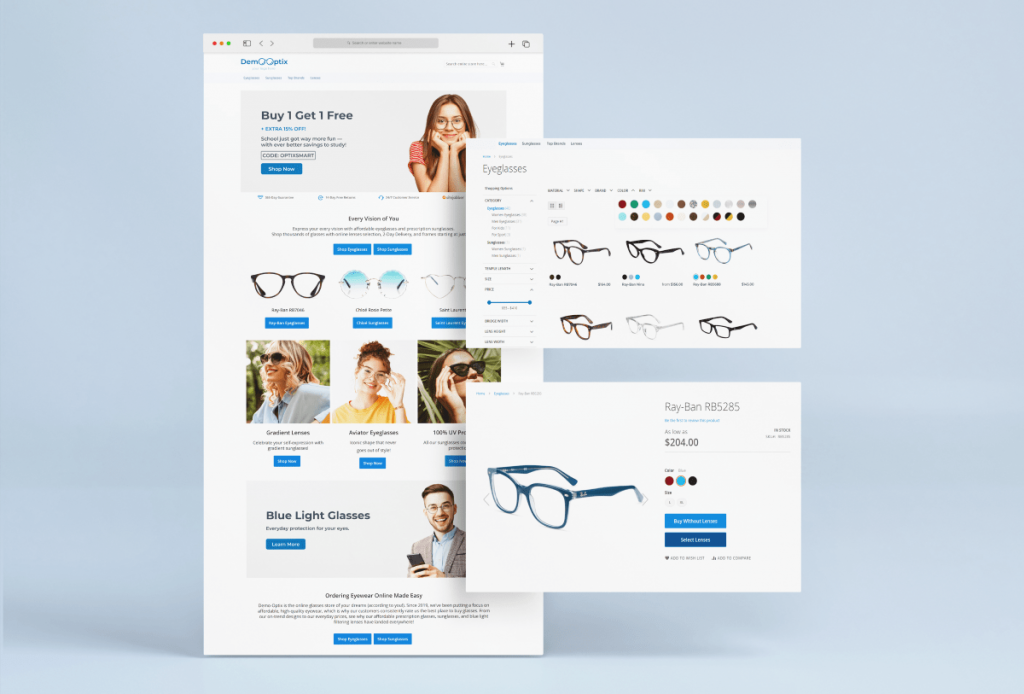
The integration of these extensions not only enriches the customer’s interaction with the online eyewear store on Magento 2 but also contributes to increased customer satisfaction and confidence in their purchase decisions.
2. Shopify
Shopify is a user-friendly, hosted e-commerce solution designed for ease of use and quick setup. With a plethora of customizable templates and a vast app ecosystem, it caters to businesses looking for a streamlined and efficient way to sell eyeglasses online. While some plans may incur transaction fees, the platform’s 24/7 customer support and user-friendly interface make it a popular choice for entrepreneurs.
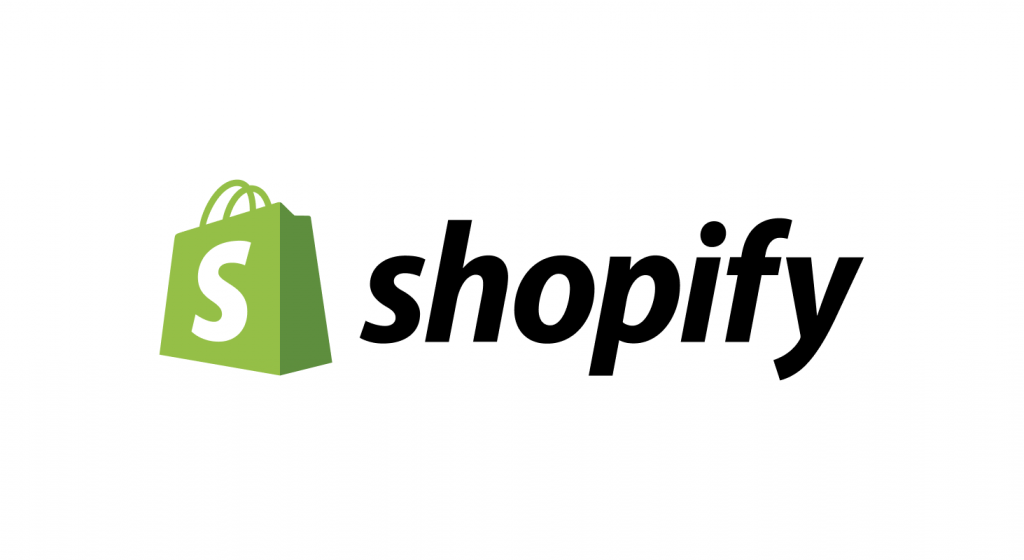
Pros:
- User-Friendly Interface: Shopify is renowned for its simplicity, making it an excellent choice for beginners. The intuitive interface allows for easy product management and order processing.
- App Ecosystem: Shopify boasts a vast app ecosystem, offering a variety of extensions to enhance the functionality of your online eyewear store.
- 24/7 Customer Support: With Shopify, you have access to 24/7 customer support, ensuring assistance whenever you need it.
Cons:
- Transaction Fees: While Shopify offers a variety of plans, some include transaction fees, which can affect overall costs for businesses.
- Limited Customization: While customizable, Shopify might not provide the same level of flexibility as open-source platforms like Magento.
3. WooCommerce (WordPress)
WooCommerce is an open-source e-commerce plugin designed to seamlessly integrate with WordPress. Ideal for businesses already leveraging WordPress, WooCommerce offers a high level of customization and a wide range of plugins. Businesses can create a unique online eyewear store by leveraging the flexibility of open-source technology while benefiting from the familiarity of the WordPress environment.
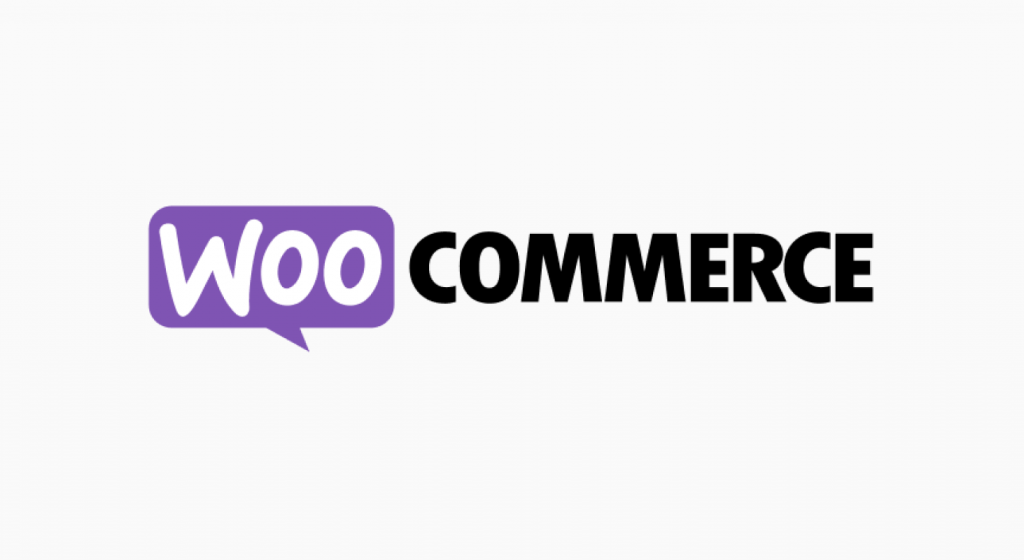
Pros:
- Integration with WordPress: If your eyewear business already utilizes WordPress, WooCommerce seamlessly integrates into your existing website, providing an efficient way to add e-commerce functionality.
- Open Source: WooCommerce is an open-source platform, offering a high degree of customization to meet your specific needs.
- Wide Range of Plugins: With a vast array of plugins available, WooCommerce allows for the integration of various features into your eyewear store.
Cons:
- Dependency on WordPress: While integration with WordPress can be an advantage, it may also pose limitations for businesses looking for a standalone e-commerce solution.
- Potential for Plugin Conflicts: The use of multiple plugins may sometimes lead to conflicts, affecting the overall stability of the online store.
4. Wix
Wix is a user-friendly website builder that offers a drag-and-drop interface for building visually appealing online stores. With affordable plans and the Wix ADI feature for quick setup, it caters to small businesses and startups. While it may lack the scalability of some other platforms, its simplicity and cost-effectiveness make it an accessible option for those entering the e-commerce space.

Pros:
- Drag-and-Drop Builder: Wix’s user-friendly drag-and-drop builder makes it easy to create a visually appealing eyewear store without the need for coding skills.
- Affordable Plans: Wix offers affordable plans, making it an attractive option for small businesses and startups.
- Wix ADI: The Wix Artificial Design Intelligence (ADI) feature can assist in creating a personalized online store based on your preferences.
Cons:
- Less Scalability: Wix might be less suitable for large-scale businesses due to limitations in scalability compared to other platforms.
- Template Limitations: While customizable, Wix templates may have limitations in terms of design flexibility.
5. Squarespace
Squarespace is an all-in-one platform that combines website building, hosting, and domain services. Known for its beautiful templates and built-in marketing tools, Squarespace simplifies the process of creating an aesthetically pleasing online eyewear store. While it may have some limitations in terms of advanced e-commerce features, its focus on design and user-friendly interface appeals to businesses seeking an integrated solution.
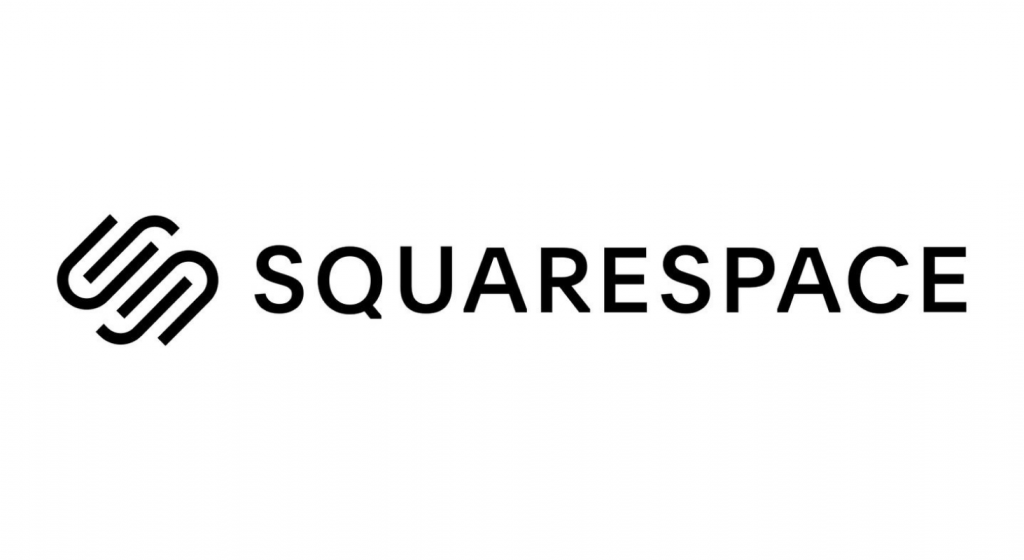
Pros:
- Beautiful Templates: Squarespace is renowned for its visually appealing and professionally designed templates, providing a polished look for your eyewear store.
- All-in-One Platform: Squarespace is an all-in-one platform, hosting and providing domain services, simplifying the setup process.
- Built-in Marketing Tools: Squarespace incorporates built-in marketing tools, facilitating promotional activities for your eyewear business.
Cons:
- Limited E-commerce Features: While Squarespace is suitable for smaller businesses, it may lack some advanced e-commerce features required by larger enterprises.
- Learning Curve: While not as steep as some other platforms, there might still be a learning curve for users new to the system.
Conclusion
To sum up, the choice of an e-commerce platform to sell eyeglasses online depends on various factors such as budget, scalability, customization needs, and ease of use. Each platform has its strengths and weaknesses, and understanding these can help you make an informed decision based on your specific business requirements.
Choosing the right platform for selling glasses online is crucial for success. While Adobe Commerce (Magento 2) offers a feature-rich and scalable solution, Optix extensions enhance the eyewear shopping experience, providing a fully customizable and user-friendly solution for businesses in this niche.








